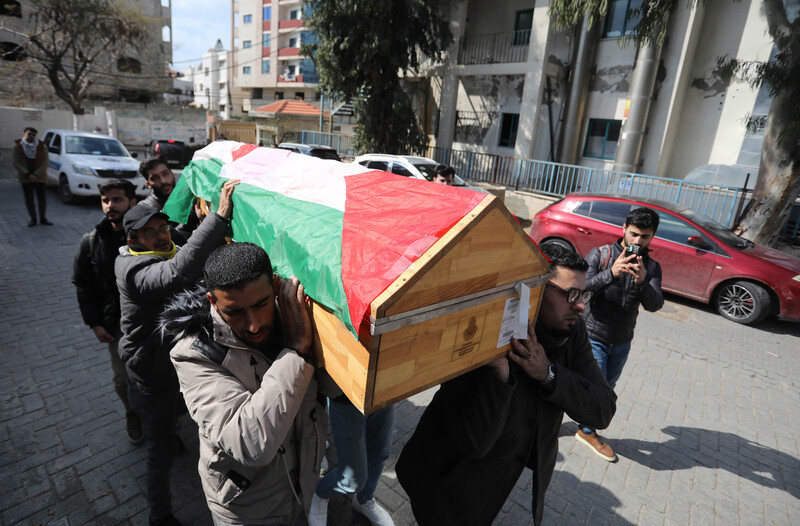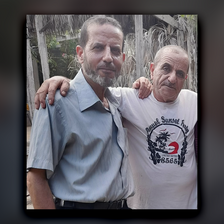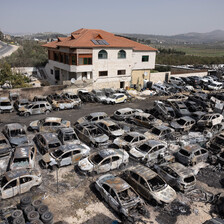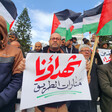The Electronic Intifada 23 February 2023

Relatives of Yousif Darabih — killed by the 6 February Turkish earthquakes — carry his coffin in Gaza City.
APA imagesMajdi Darabih used to feel a sense of relief that his son Yousif had moved to Turkey.
During Israel’s major attacks on Gaza, Majdi took comfort in the knowledge that Yousif was safe from harm.
All that changed with the earthquakes which caused devastation in Turkey and Syria on 6 February.
Yousif had spoken to his family the previous day. Yet when news of the disaster broke, they had no details about his situation.
“We posted his photo on social media to try and check on him,” said Majdi. “We hoped he was still alive. But unfortunately we heard on 9 February that his body had been found.”
Yousif was 28.
After growing up in Jabaliya refugee camp, north of Gaza City, he received a scholarship to study medicine in Turkey, emigrating there in 2013.
Qualifying as a doctor a few years ago, he lived with his brother Usama in the coastal city of Samsun.
A few months ago, Yousif moved to Antakya, the capital of Hatay province. The medical center where he had taken a job cared for refugees uprooted by the war in Syria.
According to his family, Yousif lived on the fourth floor of a seven-floor building. “The whole building was completely destroyed,” his father Majdi noted.
Majdi had hoped that Yousif would return to Gaza and work in local hospitals. Instead, Yousef’s body has been brought back in a white burial shroud.
“My heart is broken,” Majdi said.
Narrow escape
Many people in Gaza have friends or relatives living in Turkey.
My sister-in-law Manal Ismail is among them. She had a narrow escape.
Just before the earthquakes occurred, she visited a friend in the city of Mersin. Manal had barely returned to Istanbul – where she lives – when she heard about the earthquake and learned that Mersin was among the areas affected.
“We checked on our friend to make sure she is OK,” Manal said, adding that she felt “really lucky” she was no longer in Mersin.
Manal, a mother of two, moved to Turkey in 2016. She had previously lived through three major Israeli offensives against Gaza.
The earthquakes that have occurred in Turkey this month have prompted her to make the same kind of preparations that Gaza families make when under Israeli bombardment. She has, for example, placed key documents in a bag that can be grabbed if she suddenly needs to evacuate her home.
“I don’t know how to feel,” Manal said. “I felt very sad when I saw all the people running away, leaving everything behind. I cannot imagine what it would be like to run away from my home, with my kids.”
“I can’t sleep”
Approximately 47,000 people were killed in the 6 February earthquakes. More than 100 Palestinians were among the dead in Turkey and Syria.
Abdulkarim Abu Jalhoum had been a taxi driver in Gaza. Finding it extremely difficult to make ends meet, he left for Turkey 12 years ago.
He found a job with a wood factory in Antakya, with his family later joining him.
Abdulkarim, his wife Fatima and their four children were all killed on 6 February.
Their relatives back in Beit Lahiya, northern Gaza, learned what had happened to the family from a friend of Abdulkarim.
The building where they lived had collapsed, his friend informed them.
The youngest member of the family, 3-year-old Muhammad, was taken alive from the remains of the building. Tragically, he died in hospital.
“We never imagined that the whole family would die,” said Ramzi, Abdulkarim’s brother.
The family moved into a new apartment about six months ago.
Like so many other victims, the family lived in a building that was not designed to withstand earthquakes.
“My brother did not have enough information when he rented the apartment,” Ramzi said. “As long as it was nice and affordable, other things did not matter for a big family like his. If you want to have a good house in Turkey, you need to pay extra.”
Abdulkarim’s mother Widad had not seen her son since he left Gaza. So far, his body and those of his family have not been returned for burial.
“I was happy that he was enjoying a better life in Turkey – away from the constant suffering we go through here in Gaza,” Widad said. “But now I can’t sleep. I am always thinking of their bodies buried under the rubble.”
The author is a freelance writer and translator from Gaza, Palestine.





